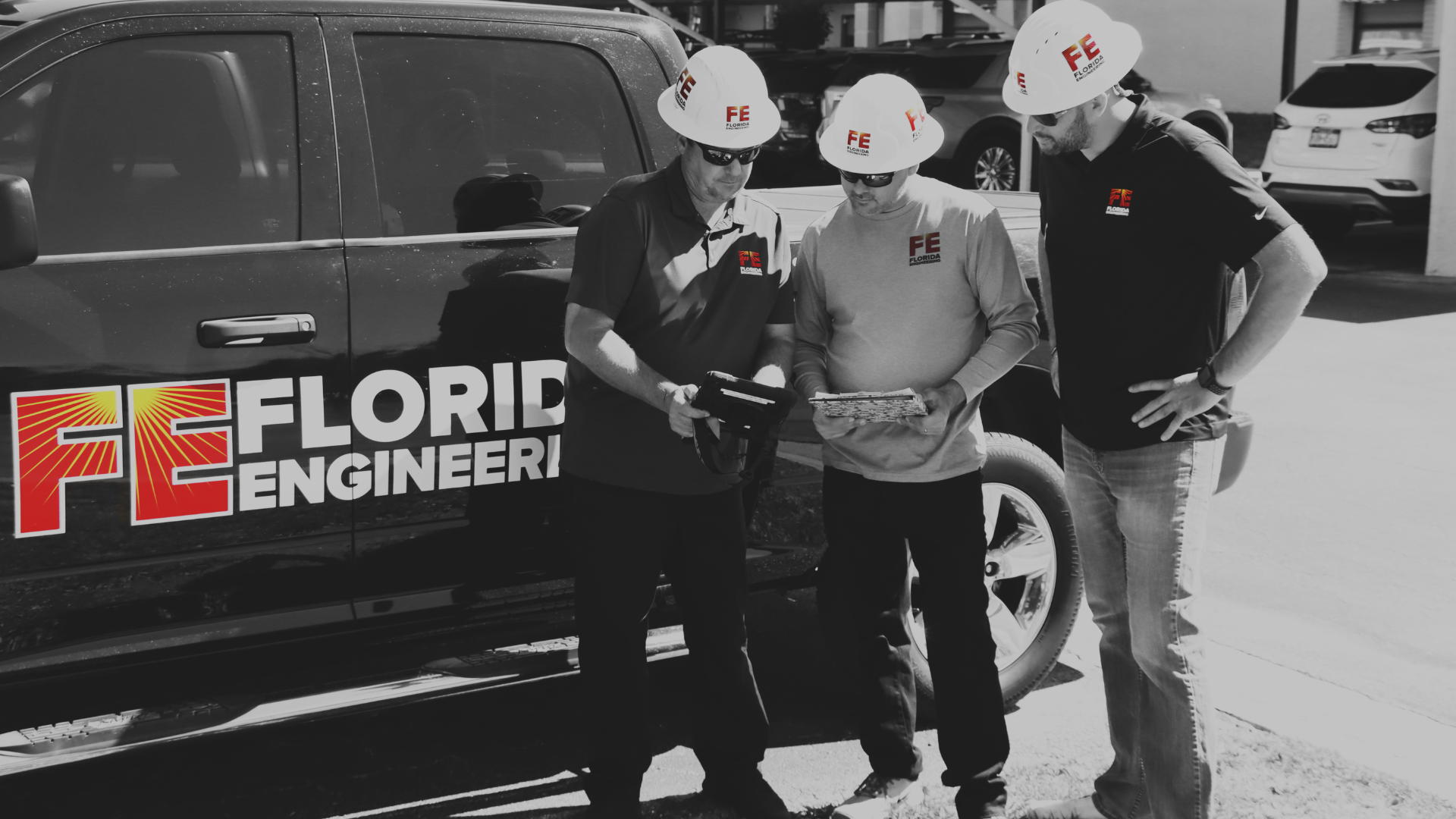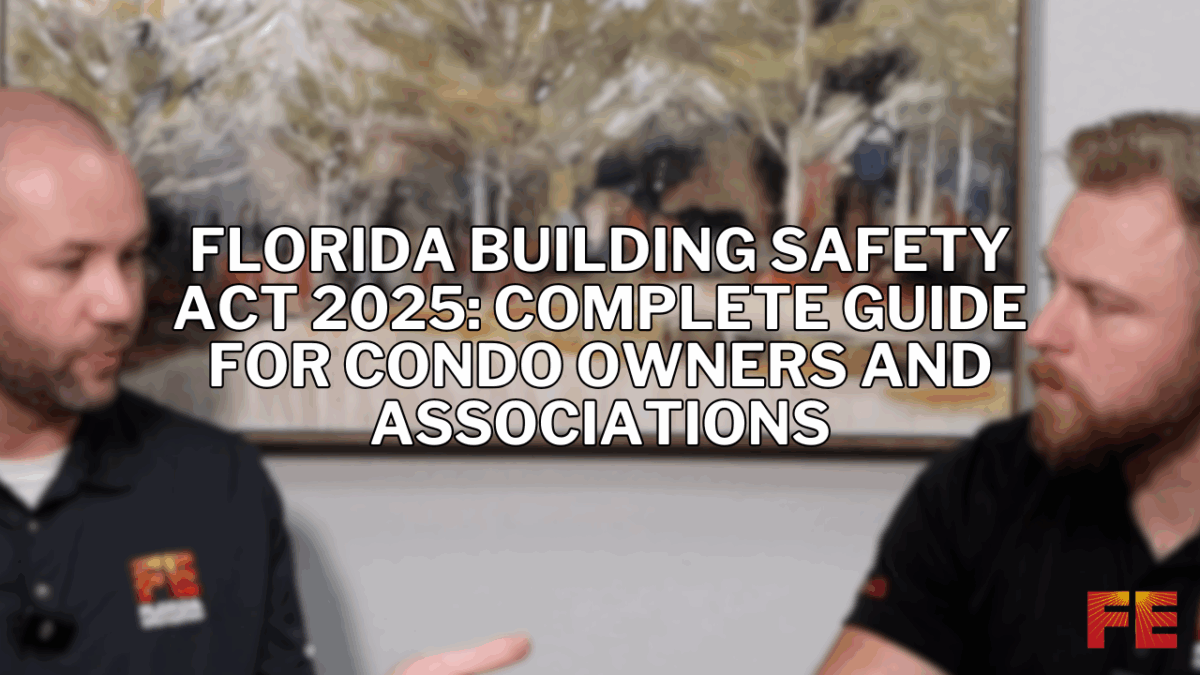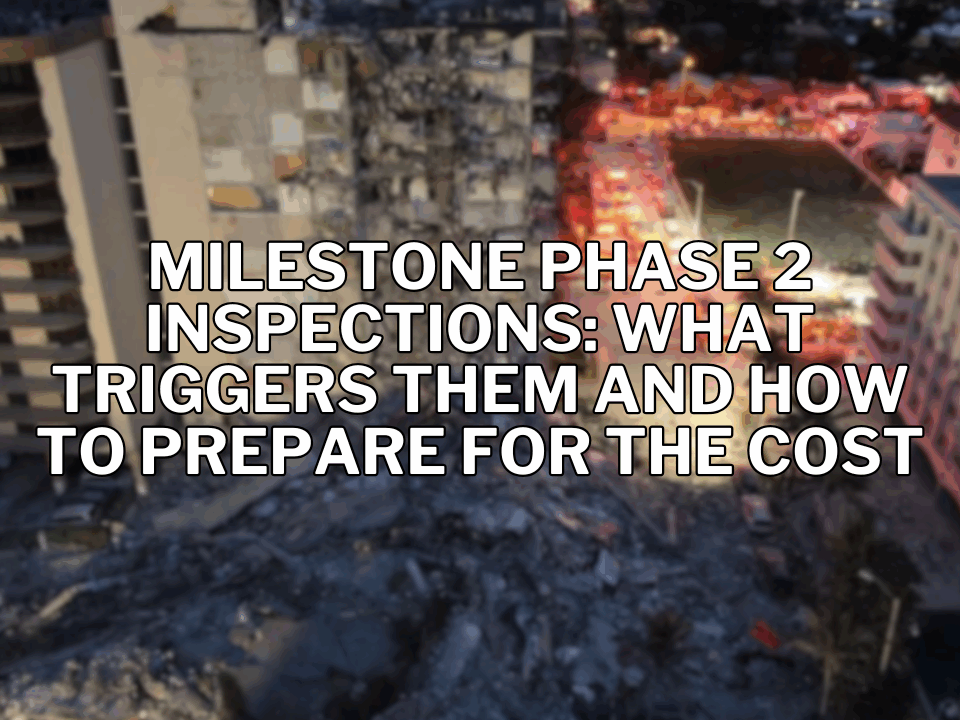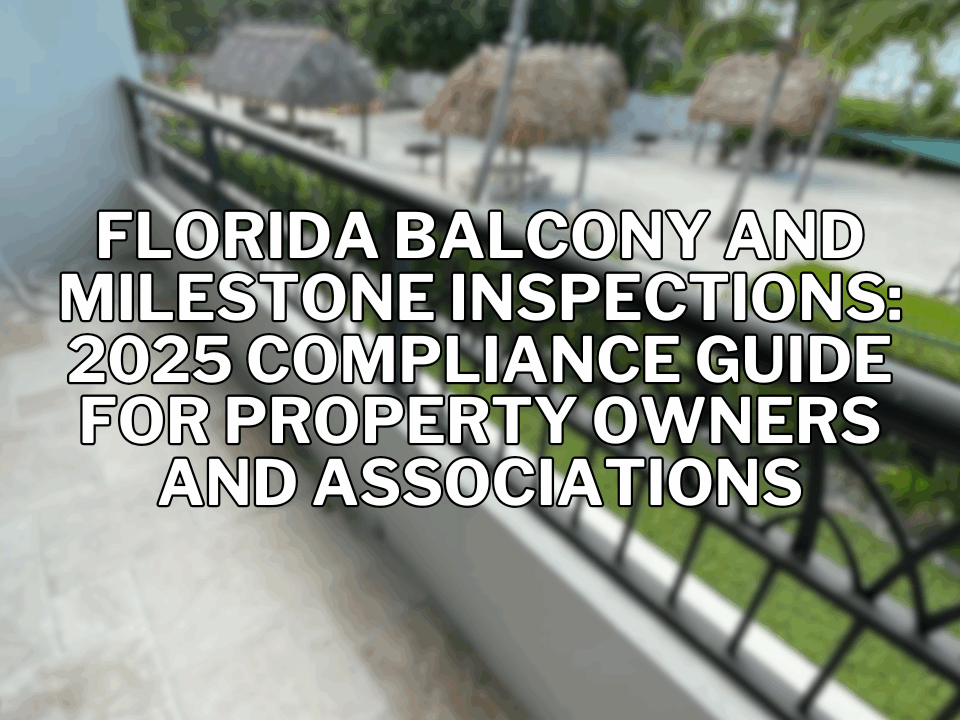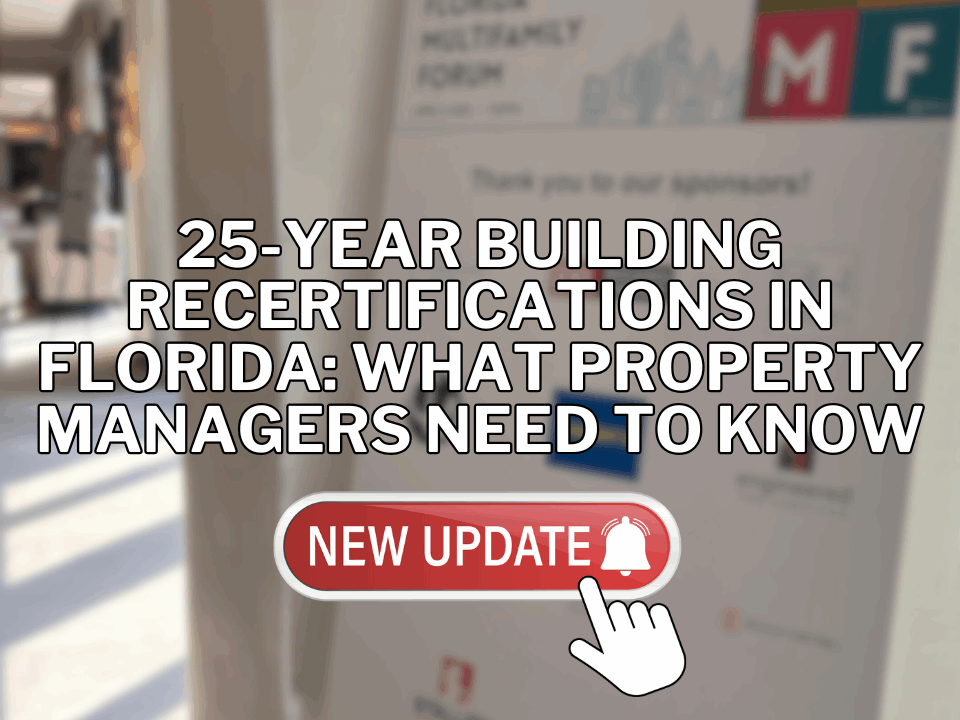Introduction
In the wake of the tragic Surfside condominium collapse in 2021, Florida lawmakers took decisive action to prevent another disaster. The Florida Building Safety Act (Senate Bill 4-D in 2022, updated by SB 154 in 2023) now requires strict safety inspections, reserve studies, and transparency measures for condominiums and cooperatives across the state.
This guide explains what condo owners, board members, and associations need to know in 2025—from inspection timelines to reserve funding rules so your community can stay compliant and safe.
Table of Contents
- Background: Why the Law Was Passed
- Milestone Inspections Explained
- Structural Integrity Reserve Studies (SIRS)
- Transparency and Reporting Requirements
- How Broward’s Program Connects
- Inspection Deadlines: What to Expect
- Action Steps for Condo Associations
- Risks of Non-Compliance
- FAQs
- Conclusion
Background: Why the Law Was Passed
- June 24, 2021: The Champlain Towers South collapsed in Surfside, killing 98 people.
- Investigations found structural deficiencies and deferred maintenance.
- The Legislature responded with Senate Bill 4-D (2022), mandating statewide safety inspections.
- Senate Bill 154 (2023, “Glitch Bill”) refined the rules, giving local governments flexibility for coastal inspections.
📌 Key takeaway: The Building Safety Act exists to make sure aging condos are safe to live in—through inspections, financial planning, and accountability.
Milestone Inspections Explained
Who Needs Them?
- All condominiums and cooperatives 3 stories or taller.
When?
- At 30 years of age, based on Certificate of Occupancy (CO).
- Every 10 years thereafter.
- Buildings within 3 miles of the coast may be required at 25 years, depending on local rules.
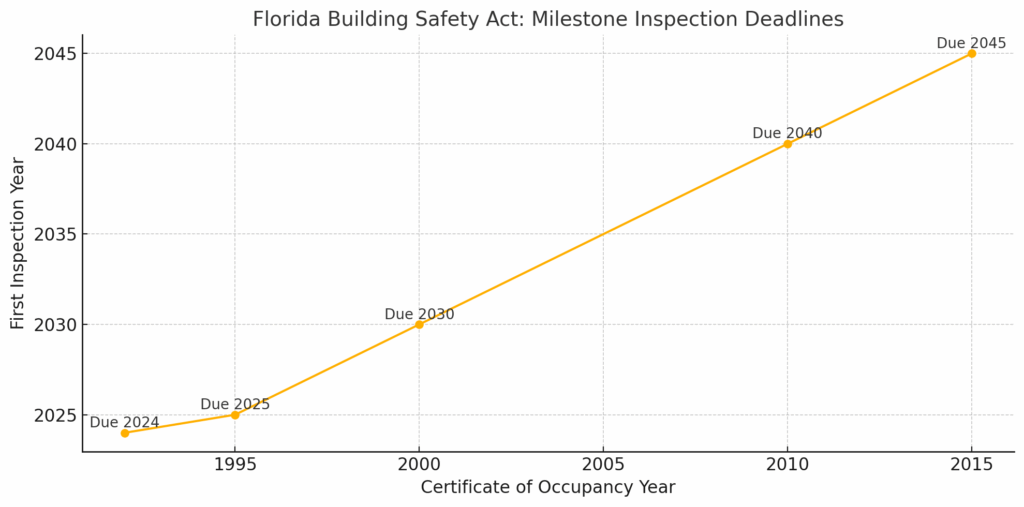
Two Phases of Inspection
- Phase 1 (Visual Check):
- Conducted by a licensed Florida engineer or architect.
- Evaluates structural safety with a non-invasive review.
- If no issues → Phase 2 is not needed.
- Phase 2 (Detailed Testing):
- Required if Phase 1 finds signs of deterioration.
- May involve destructive or nondestructive testing.
- Goal: confirm structural soundness and recommend repairs.
Owner-friendly note: Think of Phase 1 like a doctor’s check-up. If the doctor sees something concerning, they order additional tests, that’s Phase 2.
Structural Integrity Reserve Studies (SIRS)
The Act also requires condo associations to conduct reserve studies:
- Every 10 years for common structural elements.
- Covers items like roofs, foundations, load-bearing walls, fireproofing, plumbing, and electrical systems.
- Starting 2025, associations cannot waive or underfund reserves for these critical items.
Owner-friendly note: This means your monthly dues may increase, but it ensures money is available for future repairs, so you’re not hit with massive surprise assessments.
Transparency and Reporting Requirements
- Inspection reports must be:
- Distributed to all unit owners.
- Posted on association websites (if required).
- Retained for at least 15 years as official records.
- Associations must also notify owners of upcoming inspections and share findings promptly.
This protects owners by keeping everyone informed—no more hidden reports about building conditions.
How Broward’s Program Connects
Before SB 4-D, Broward County already had its own Building Safety Inspection Program (BSIP). Updated in 2023, BSIP requires:
- Inspections at 25 years and then every 10 years.
- Both structural and electrical systems must be reviewed.
- Repairs must be completed within 180 days of deficiencies being found.
Broward’s program is stricter than state minimums and serves as a model for coastal communities.
Inspection Deadlines: What to Expect
- Buildings with CO issued on or before July 1, 1992 must complete first milestone inspection by December 31, 2024.
- After that, inspections occur at regular 10-year intervals.
Example Timeline:
Chart shows typical milestone inspection deadlines based on CO year.
Action Steps for Condo Associations
- Check Your Building’s Age: Find your CO date.
- Hire Licensed Professionals: Only Florida engineers/architects can sign reports.
- Plan Your Budget: Factor inspection and reserve study costs into annual budgets.
- Communicate Clearly: Keep owners updated to avoid surprises.
- Prepare for Coastal Factors: Saltwater exposure accelerates deterioration—coastal buildings may face earlier inspections.
Risks of Non-Compliance
- Unsafe Structure Designation: Your building may be deemed unsafe for occupancy.
- Legal Liability: Boards risk lawsuits or fiduciary breaches.
- Fines & Enforcement: Counties may impose penalties for missed deadlines.
- Insurance Issues: Non-compliant buildings may struggle to obtain or renew coverage.
FAQs
What is the Florida Building Safety Act?
The Florida Building Safety Act (SB 4-D & SB 154) requires milestone structural inspections of condominiums and cooperatives 3+ stories tall at 30 years of age (25 years near the coast) and every 10 years thereafter, plus mandatory reserve studies and transparent reporting.
Can my condo waive reserves?
No. Starting 2025, condo associations can no longer waive or reduce reserves for critical structural items like roofs, foundations, and load-bearing walls.
Who pays for inspections?
The condominium or cooperative association is responsible for hiring engineers/architects and covering all related costs.
Conclusion
Florida’s Building Safety Act ensures that the tragedy of Surfside is never repeated by making inspections, reserves, and transparency non-negotiable.
Protect your investment, safeguard your neighbors, and stay compliant, partner with Florida Engineering LLC today to navigate the new building safety laws with confidence.
The Milestone Inspection Experts – Florida’s Condominium Inspections
- Phone: 941-391-5980
- Email: contact@fleng.com
- Address: 4161 Tamiami Trail, Suite 101, Port Charlotte, FL 33952
Connect With Us
Related Services
- Balcony Inspections
- Disclosure of Condition of Building
- 25,30,40,50,60 Year Recertifications
- Infrared Thermography Inspection Services
- Turnover Inspections
[This above text is for information purposes only and does not constitute engineering or legal advice. Please consult a professional engineer and licensed attorney for any specific answers to your questions about Milestone Inspections, Balcony Inspections and the legal obligations entailed.]

